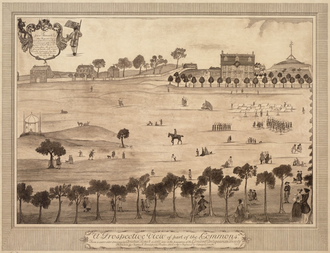Discover Your Roots
SIGN UPDiscover Your Roots
SIGN UPThe first name Boston is of English origin and is primarily used for males. It means "From St. Botolf's Stone." The name Boston has historical significance as it was named after the market town of Boston, Lincolnshire in England by English Puritan settlers in 1630. The city of Boston has played a pivotal role in American history, particularly during the American Revolution and Revolutionary War, and has since emerged as a global leader in higher education, research, innovation, and various industries. With a population of 675,647 as of the 2020 census, Boston is known for its cultural and financial significance in New England. The name Boston carries a sense of historical and geographical importance, reflecting the city's rich heritage and contributions to various fields.

The Boston Red Sox, a renowned American professional baseball team, have etched their name in history with a remarkable legacy. Established in 1901, the team has been a prominent member of Major League Baseball, competing in the American League East Division. Known for their iconic home ballpark, Fenway Park, the Red Sox have clinched an impressive nine World Series championships, solidifying their status as one of the most successful MLB teams. However, their journey to glory was not devoid of challenges, as they endured an 86-year championship drought, famously referred to as the "Curse of the Bambino," following the sale of Babe Ruth to the New York Yankees in 1918. Notable moments in their history include the "mad dash" in 1946 and the "Impossible Dream" of 1967. The fierce rivalry with the New York Yankees has added an extra layer of excitement to their journey. Under the ownership of Fenway Sports Group, the Red Sox have consistently garnered high attendance and hold the record for selling out every home game over a span of 820 games. With a rich history and an unwavering fan base, the Boston Red Sox continue to make significant contributions to the legacy of baseball.

"Created by former lawyer and Boston native David E. Kelley, Boston Legal is an American legal comedy drama television series that aired from October 3, 2004, to December 8, 2008. The show, a direct spin-off of The Practice, follows the exploits of former character Alan Shore and his colleagues at the high-end litigation firm Crane, Poole & Schmidt. Starring James Spader, William Shatner, and Candice Bergen, Boston Legal received critical acclaim and 26 Primetime Emmy Awards nominations, including for Outstanding Drama Series in 2007 and 2008, as well as a Peabody Award in 2005. The series is known for its portrayal of the chemistry between the smarmy Alan Shore and the flamboyant and eccentric Denny Crane, as they handle both civil and criminal law cases in Boston. The show's production involved the hiring of British writer and barrister John Mortimer as a consultant and went through cast changes throughout its five-season run, with notable actors such as Monica Potter, Mark Valley, Julie Bowen, and John Larroquette joining the ensemble. Despite not being a Nielsen ratings smash hit, Boston Legal left a lasting impact on television and legal drama enthusiasts."(Word count: 196)

The Boston Strangler, also known as the "Mad Strangler of Boston," was responsible for the murder of 13 women in Greater Boston during the early 1960s. Initially assumed to be the work of one unknown person, the killer was also referred to as the "Phantom Fiend" or "Phantom Strangler." Between June 14, 1962, and January 4, 1964, 13 single women between the ages of 19 and 85 were murdered in the Boston area, most of whom were sexually assaulted and strangled in their apartments. Although initially believed to be the sole perpetrator, controversy arose as some parties suggested that the murders may have been committed by more than one person. Albert DeSalvo, who was eventually linked to the final victim through DNA evidence, confessed to the crimes and was later charged and convicted. However, no physical evidence substantiated his confession. The case of the Boston Strangler remains a significant and controversial part of crime lore, with ongoing debate surrounding the true identity and motives of the perpetrator.

Boston College (BC) is a private Catholic Jesuit research university in Chestnut Hill, Massachusetts, United States. Established in 1863, the university boasts a student population of over 15,000. The campus, located 6 miles west of downtown Boston, features some of the earliest examples of collegiate gothic architecture in North America. Boston College offers a wide range of degrees through its nine colleges and schools and is classified as a "Research 1: Very High Research Spending and Doctorate Production" university by the Carnegie Classification. The university's athletic teams, known as the Eagles, compete in NCAA Division I as members of the Atlantic Coast Conference. Notable alumni and affiliates of Boston College include governors, ambassadors, members of Congress, scholars, writers, medical researchers, Hollywood actors, and professional athletes. The university's early history is rooted in the efforts of the first Jesuit community in New England, and it has since expanded to become a beacon of Jesuit scholarship under the leadership of President Thomas I. Gasson, S.J. Boston College has continually evolved, adding various graduate schools and becoming fully coeducational in 1970. The university's impact extends beyond academia, with alumni including three Rhodes, 22 Truman, and 171 Fulbright scholars.

The Boston Brahmins, historically associated with an upper-class status in Boston, were influential in American institutions and culture from the late 19th to mid-20th century. Coined by Oliver Wendell Holmes Sr., the term "Brahmin Caste of New England" originated in 1860, inspired by the Hindu caste system. These individuals, considered White Anglo-Saxon Protestants (WASPs), were known for their cultivated New England accent, Harvard University education, Anglicanism, and adherence to traditional British-American customs and attire. The Brahmins, descendants of early English colonists, were characterized by their pursuit of suitable marriage alliances with old aristocratic New England families to elevate their social standing. They upheld high standards of excellence, duty, and restraint, embodying an enlightened aristocracy. Emphasizing personal virtues and character, they were involved in philanthropy, arts, and assumed leadership roles in the community. This elite class maintained reserved mannerisms, Anglo-American attire, and was politically aligned with Federalists, Whigs, and Republicans. The Brahmin families have a lineage tracing back to the colonial ruling class, with some entering the aristocratic society in the 19th century through commerce and trade, often marrying into established Brahmin families.
All images displayed on this page are sourced from Wikipedia or Wikimedia Commons.We use these images under their respective Creative Commons or public domain licenses. Wherever applicable, author attributions and license information are provided. If you believe an image is used incorrectly or outside its license terms, please contact us so that we can review and correct the issue.